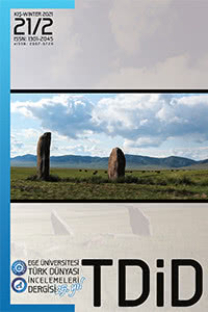Dede Korkut Kitabında Erginlenme ve Bireyleşme Sürecinde Sınama Motifinin İşlevi
İnsan davranışlarının kültürel temellere dayandığını ifade eden Philip K. Bock, “tüm antropoloji psikolojiktir” diye başladığı “İnsan Davranışının Kültürel Temelleri” adlı kitabını, “tüm psikoloji kültüreldir” diye bitirir. Türk kültürünün en önemli miraslarından biri olarak kabul edilen Dede Korkut Kitabı’nın âdeta bir sınamalar kitabı olduğunu söylemek mümkündür. Philip K. Bock’un tezinden hareketle; Dede Korkut Kitabı’nda yer alan on iki anlatma çerçevesinde, sınama motifi ve işlevleri tartışılmıştır. Dede Korkut Kitabı’ndaki sınamaların, kültürel bir eğitim süreci olduğuna dikkat çekilerek; bu sınamaların kendine özgü zamanı, mekânı, kuralı, ödül ve kazanımı, yaptırım ve cezası bulunan bir oyun gibi düşünülebileceği vurgulanmıştır. Sınama motifinin anlatmalardaki kullanımı dikkate alınarak sınıflandırılmış ve işlevleri incelenmeye çalışılmıştır. Sınama ve sınanmanın; aktif katılımlı bir öğrenme ve öğretim modeli olarak kişiyi bedenen ve ruhen hayata hazırlama, bireysel ve toplumsal bir kimlik oluşturma, kültürel ve toplumsal belleği kullanma, koruma ve aktarma, sosyal düzeni koruma ve sürdürme, ders verme, sembol davranışlarla toplum yapısındaki bozulmaya ve değer yargılarındaki değişime dikkati çekerek uyarma işlevi başta olmak üzere açık ve kapalı pek çok işleve sahip olduğu belirtilmiştir. Kahramanların yanı sıra, geçmiş ve şimdinin; eski ve yeninin de simgesel olarak sınandığı Dede Korkut Kitabı’nda; sınanan kişi ve kişiler, sınama çeşitleri, sınamanın yapıldığı ortamlar, sınamanın sembolik anlamı, sınamanın sonucu (ödül- ceza, kazanım- kayıp) ayrıntılı olarak değerlendirilmiştir.
Function of the Testing Motif During the Process of Maturing and Individualization in the Book of Dede Korkut
Philip K. Bock, states that human behavior relies on cultural basis, starts his bookPhilip K. Bock, states that human behavior relies on cultural basis, starts his bookPhilip K. Bock, states that human behavior relies on cultural basis, starts his booknamed “Cultural Basis of Human Behavior” by saying “all about anthropology isnamed “Cultural Basis of Human Behavior” by saying “all about anthropology isnamed “Cultural Basis of Human Behavior” by saying “all about anthropology ispsychological” and finishes by saying “all about psychology is cultural”. It is pospsychological” and finishes by saying “all about psychology is cultural”. It is pospsychological” and finishes by saying “all about psychology is cultural”. It is possible to say that the Book of Dede Korkut, considering as one of the most imsible to say that the Book of Dede Korkut, considering as one of the most imsible to say that the Book of Dede Korkut, considering as one of the most important heritages of Turkish culture, is almost a book of testing. Moving from theportant heritages of Turkish culture, is almost a book of testing. Moving from theportant heritages of Turkish culture, is almost a book of testing. Moving from thethesis of Philip K. Bock, the testing motif and its functions is discussed within thethesis of Philip K. Bock, the testing motif and its functions is discussed within thethesis of Philip K. Bock, the testing motif and its functions is discussed within thetwelve narratives in this paper. It is stressed that testings in the Book of Dedetwelve narratives in this paper. It is stressed that testings in the Book of Dedetwelve narratives in this paper. It is stressed that testings in the Book of DedeKorkut looks like a part of cultural training process and could be imagined as aKorkut looks like a part of cultural training process and could be imagined as aKorkut looks like a part of cultural training process and could be imagined as agame with its own specific timeline, place, rules, gift and incentives and sanctionsand punishment. The testing motive is classified according to its usage in narratives and its functions are analyzed. It is stated that testing and to be testedhave a lot of direct and indirect functions such as warning function while it helpsto prepare person to life physically and spiritually as an active education model,to form a personal and social identity, to use cultural and social memory, to saveand to transform, to maintain the social order, to give lesson, to attract attentionto the change in social structure and standards of judgment by symbol behavior.Besides the heroes, person or people to be tested, varieties of testing, places oftesting, symbolic meaning of testing and results of testing (gift- punishment, incentives- sanctions) are analyzed in detail in this paper
- ISSN: 1301-2045
- Başlangıç: 1996
- Yayıncı: Ege Üniversitesi Türk Dünyası Araştırmaları Enstitüsü
Sayıdaki Diğer Makaleler
Dedem Korkut Kitabındaki Silah Terminolojisi Üzerine Bir İnceleme
Doç. Dr. Abdullah TEMİZKAN, Recep Efe ÇOBAN
Dede Korkut Kitabı'nda Erginlenme ve Bireyleşme Sürecinde Sınama Motifinin İşlevi
1922--1927'de "Kitab--ı Dede Korkut" Hakkında Yapılmış Bir Araştırmanın Yayımlanmamasının Nedenleri
Dede Korkut Kitabı'nda Tipik Bir İstinsah Hatası Üzerine
Deli Dumrul Anlatmasında Ötenazi Kalıntısı
Dede Korkut Anlatmalarından Hareketle Ağıt Türü Üzerine Bir Değerlendirme
